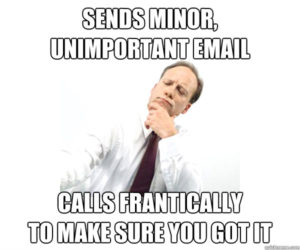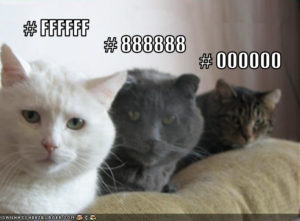It’s a story I think many of us in the web industry, and especially the WordPress industry, relate to: you love building websites as a hobby, and you’re good at it. You spend all your time reading up on the latest coding standards and trying out cool hacks to your weekend workflow. You build some sites for fun, some for friends and family, and people really love your work. You start going to meetups and WordCamps, getting a little more involved, and you see all kinds of folks making their income in all different ways, and you think, “Huh, I could do that.” So you take the plunge – you quit your day job and go full-time as a freelancer.
Workin’ like a rockstar, burnin’ like a supernova
 At first, you are royalty amongst coders. You provide awesome websites for loving clients who adore that you are so accessible, that you are so willing to negotiate prices, and who truly believe you when you vow you won’t disappear like the last guy. You pad around your house in PJs, happily making your own schedule and your own cold brew, glad to be rid of the constraints of the 9-to-5. You finally get to spend all the time you want in the world of your interests – PHP and plugins and themes, oh my.
At first, you are royalty amongst coders. You provide awesome websites for loving clients who adore that you are so accessible, that you are so willing to negotiate prices, and who truly believe you when you vow you won’t disappear like the last guy. You pad around your house in PJs, happily making your own schedule and your own cold brew, glad to be rid of the constraints of the 9-to-5. You finally get to spend all the time you want in the world of your interests – PHP and plugins and themes, oh my.
But eventually – and this might take a few months or a few years – the glow starts to wear off the laptop screen. There are mild signs – you realize you’re always a bit irritated with your clients, perhaps. You’re getting a little tired of chasing down unpaid invoices. Maybe you’re frustrated with trying to raise your prices – why can’t they see you’re the expert, and pay you accordingly? There could be larger signs, too – you never change out of said PJs. You don’t often leave the house, and when you do, friends are surprised not only to see you, but that you showered for the occasion. You turn down most social gatherings anyway, because you “have some work to finish up,” and you can’t remember your last “day off” or “weekend.” And maybe, at the end of it all, you become that web guy who doesn’t return any calls or emails, and you just disappear.
Okay, I admit that for most of us who’ve lived and learned as freelancers, this narrative is a bit extreme. But there are a lot of resources out there about how to start freelancing, and not a ton of information about the equally important opposite: when it might be time to stop. So let’s take a look at the top five signs you may be veering towards the path of disappearing, and see if we can’t head you off at the pass.
1. You really, really hate talking to clients

This seemingly benign sign can quickly escalate into a full-blown emergency state. Remember, clients want to give you money. They want you to do great work for them. But if you find yourself resentfully answering their (endless) emails, or despising that you gave them your cell number and told them to just call any time, you might need to let someone else handle that work for you.
Sure, you could hire out your own project manager, but web shops and agencies already have great systems in place for client interactions, and even if there’s no PM, there’s usually another team member to help with the communication load or act as the point-person.
2. The stress of a variable income is wearing you down

At first, the potential was limitless. You could set your rates and work accordingly. But over time, you hit a price ceiling. You’re only one person, after all, with only so many hours. Or, maybe you fell sick and needed to sleep it off for a week, and now that’s a week with nothing to bill. And let’s not forget about (gasp!) tax time. Once upon a time, your write-offs totally justified your love of this work, but as you increase your income, those quarterly tax forms start ruling your life. How are you supposed to find time to actually work on websites with all this paperwork?
Getting out of the freelance flow can rekindle your love for building websites, because all that other non-code-or-design stuff gets handled for you. (We web shop workers should give our HR people gigantic hugs and coffees and kittehs. I’m looking at you, April.)
3. You’ve plateaued in your skills

Back when websites were your hobby, you loved keeping up with the latest and greatest. But now that they’re your full-time, all-the-time gig, churning out the same billable work week after week takes precedence to those fun knowledge projects you used to tinker with. Maybe you know you’re behind. Are you not using a CSS preprocessor? Stopped listening to ShopTalkShow? Do you feel like you’re juuuust fully understanding jQuery – but now there’s React and AngularJS, and holy cow, now you have to learn ES6 and the REST API, and why can’t everything just slow down?
Stepping back into a team environment can be a great way to level up your skills again. You get to learn from the brilliance of other coders in a direct way. No more tentatively reaching out over Twitter for advice; just hop into Slack and ask away. And since the projects from a shop are probably more varied and larger than what you’ve been able to take on alone, you have a chance to immediately apply all those cool new techniques and standards in a real-world situation, multiplying your knowledge again.
4. You’ve lost any sense of work-life balance

What’s that you say? A day off? A sick day? A whole week off for the holidays? No way, man. Not possible. If you find yourself working evenings and weekends, taking your laptop on vacations, and working with a WIFI tether while your partner drives you on your annual road trip, you might want to consider stepping back into the regular workday.
After an extended time of setting your own schedule, which for many of us becomes “setting NO schedule,” it can be a huge relief to sign off from work at the end of the day, let alone do something radical like take a paid vacation day. You owe it to your brain and loved ones to leave the projects behind on weekends and during family time, and a regular ol’ job can get you back in touch with that freedom.
5. Most of your conversations are with your cat

And your cat doesn’t care for the upcoming changes in core 4.7. Admit it. Freelancing can be lonely, even for those introverts among us who might love to listen more than talk (raises hand).
Office culture (or Slack channel culture, for distributed teams) provides a lot of hey-lets-geek-out-together social rewards, not to mention a place to vent, and (as mentioned above) tons of learning and problem solving opportunities. It’s great to have a team to call on for another set of eyes while debugging, or have someone else who loves building modals take that (horrible) task off your plate. And one cannot discount the therapeutic effect of endlessly sharing GIFs with those who know just what you meant by that dancing hotdog.
Sometimes, a job gives you your life back

Freelancing can be amazing for a lot of web workers, offering the opportunity to direct your own skills, follow your passions, and set rates you deserve. However, working on a larger team also has some incredible benefits (bah-dum-cha, I didn’t even mention employer benefits. Chalk that one up under #2, above…). If you find that you’re dragging yourself to your laptop each day, avoiding opening your email account, or lamenting how “behind” your skills are getting, you might want to keep an eye open for shop or agency jobs that interest you. See what top shops are looking for, and if you match that description. Think about the possible freedom of having evenings and weekends again. Apply on a whim, and during the interview process, clock your feelings – are you excited at the prospect of a 401K? Does the idea of having a code review make your heart sing? Or are you finding the opposite – that the structure of a company sounds too restrictive, or that the rates you can command alone are still too alluring. You’ll know from the process which way you’re leaning. And if you decide to stop freelancing, rest assured that you can always, always jump back in – and with a whole new perspective on why you love, or maybe don’t love, working for yourself.
Nice points you make in this post.
I have been a freelancer for some years now and can relate.
When you start working as a freelancer you add layers of complexity to your job and that may take the fun out of it.
I think that there’s another option and it is getting organized and instead of working alone trying to get a partner that gets the projects and management.
Everything has its cons and pros.
Absolutely, that’s a great point, Camilo. I think the auxiliary post to this one would be about learning when it might make sense to level up your freelancing business into a larger or more formal business.
The great thing about freelancing is that if you’re smart about it and stay on top of your game, you can translate those skills directly into a number of different work arenas – whether that’s taking a position at an established company, or founding a company on your own.
Hey folks, great post! I’ve been freelancing full-time for just over 9 years and am starting to feel a bit worn down juggling all the clients and projects myself. I’m also a new dad, so the feast-or-famine roller coaster won’t be feasible for much longer.
At this point, unfortunately, I don’t think I could ever work in an office again. I tried a short in-house stint with a local agency earlier in the year and that failed miserably.
I’m only just starting my search, but do you have any recommendations for finding companies that are a little more progressive and have remote positions? Thanks!
Hi Nick – we certainly agree that working remotely is the best of all worlds, particularly when you’re raising a family, and wish you the success on your search! More and more of the job boards are adding a ‘remote’ option to their locations filter, so I’d definitely start there. Even indeed.com will allow the keyword ‘remote’ instead of physical location or zip code in the “Where” field on their searchform. There are also remote-only job boards to check out, like remoteok.io, which specializes in tech jobs and also has company profiles, and skipthedrive.com. I would also consider researching companies whose work you admire and are inspired by first, and then going deeper to see if they offer remote positions. More and more web-based agencies are open to hiring remotely, so if you come to them with the right combination of interest and skills, its possible you could pitch the idea of a remote part-time or even full-time position to a company that perhaps hasn’t tried a distributed team before. Good luck!
Great, thanks for your feedback and links Shannon!